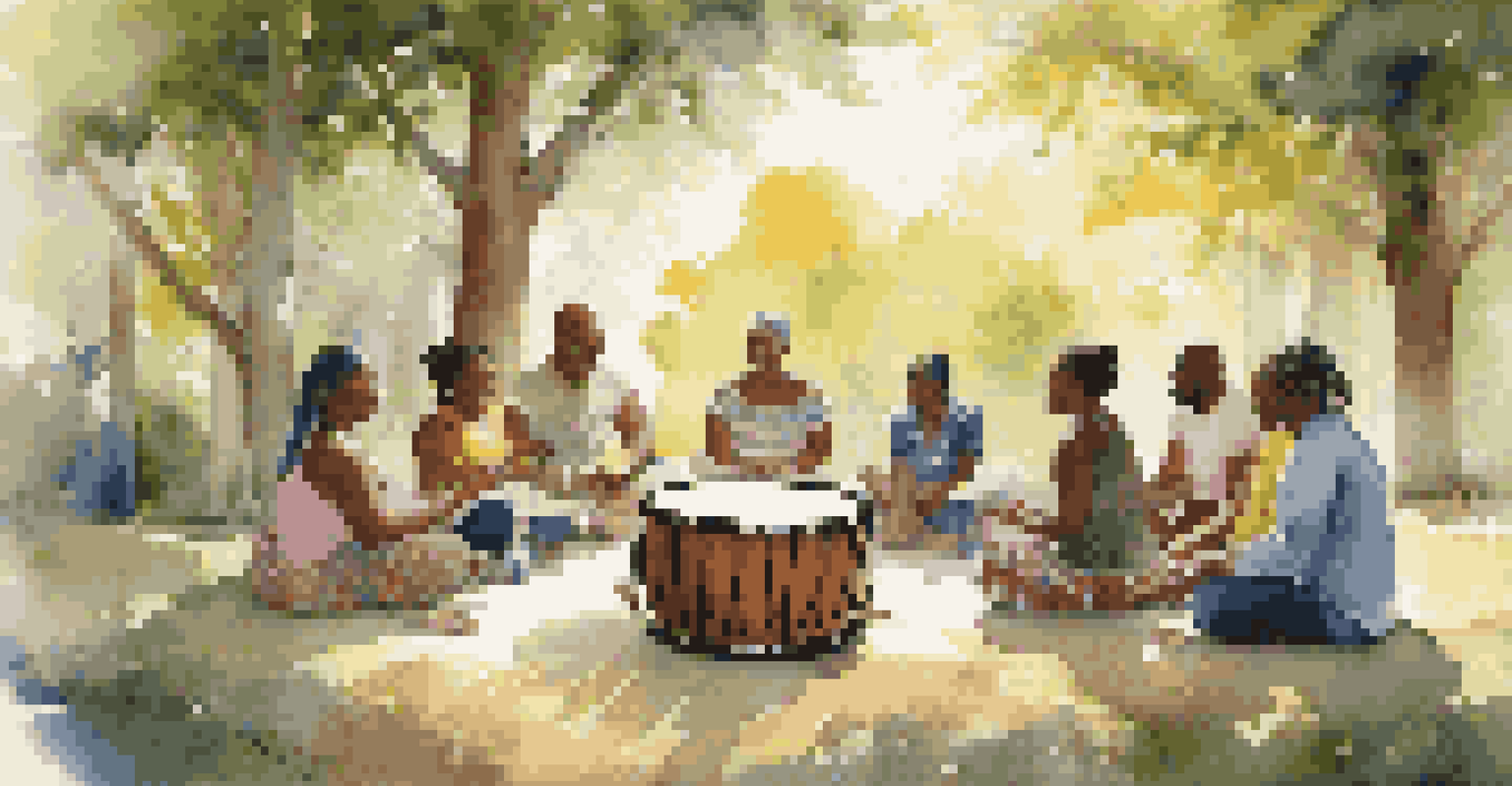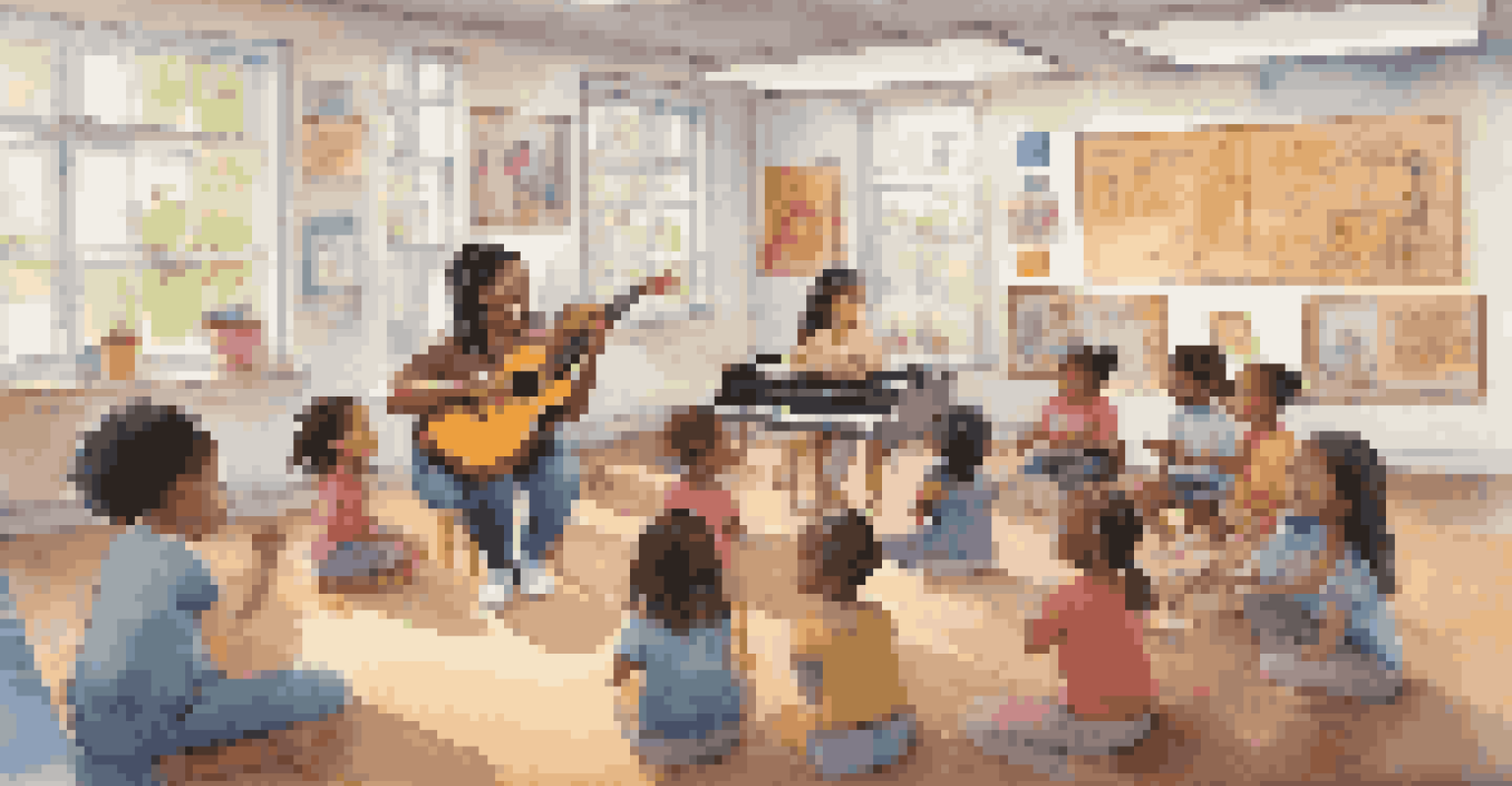The Role of Music in Promoting Peace and Understanding Globally

Music as a Universal Language for Connection
Music transcends borders and languages, making it a unique medium for connection. It speaks to emotions, allowing people from different cultures to share experiences without the need for words. For instance, a simple melody can evoke feelings of joy or sadness, which everyone can relate to, regardless of their background.
Music is the universal language of mankind.
This universal aspect of music fosters empathy, as listeners can resonate with the emotions behind the notes. When people come together through music, they often find common ground, leading to deeper understanding and friendships. Think of a concert where individuals from diverse backgrounds unite; the shared experience can break down barriers.
Moreover, music can serve as a bridge between different communities, creating opportunities for dialogue and collaboration. When musicians collaborate across cultures, they not only create beautiful sounds but also weave stories that reflect the richness of their respective heritages.
Historical Examples of Music in Peace Movements
Throughout history, music has played a crucial role in peace movements. For instance, during the 1960s, songs like 'Imagine' by John Lennon became anthems for peace, promoting messages of unity and hope amidst conflict. These songs inspired many to envision a world free of violence and division.

Another notable example is the 'We Are the World' initiative in the 1980s, where numerous artists came together to raise awareness and funds for famine relief in Africa. This collaboration not only showcased the power of music to unite but also demonstrated its potential to drive social change and understanding.
Music Connects Across Cultures
Music transcends language barriers, creating emotional connections and fostering empathy among diverse communities.
These historical moments remind us that music can amplify voices and bring attention to critical issues. When artists use their platforms to advocate for peace, they inspire others to join the cause, creating ripples of change that can lead to a more harmonious world.
Promoting Cultural Understanding Through Music Festivals
Music festivals are a vibrant celebration of cultural diversity and understanding. Events like the Global Citizen Festival bring together artists from various backgrounds to share their music and messages of peace. These festivals create a space where people can learn about different cultures while enjoying a shared love for music.
One good thing about music, when it hits you, you feel no pain.
By attending such events, individuals are exposed to new sounds, traditions, and ideas, fostering an environment of curiosity and respect. This exposure can lead to meaningful conversations and connections that transcend cultural divides. Imagine a festival where you dance to rhythms from around the world, feeling a collective joy that unites everyone present.
Furthermore, music festivals often promote social causes, encouraging attendees to engage with issues like poverty, climate change, and human rights. The combination of entertainment and activism can inspire a new generation to advocate for peace and understanding in their communities.
The Role of Music Education in Fostering Peace
Music education plays a vital role in instilling values of peace and understanding from a young age. By learning to play an instrument or sing in a choir, children develop teamwork, discipline, and empathy. These skills are essential for creating a more harmonious society.
In schools, music programs often promote inclusivity by encouraging students from diverse backgrounds to collaborate. This interaction helps break down stereotypes and fosters respect for different cultures. For example, a group project where students create a song together can teach them the importance of listening and valuing each other's perspectives.
Historical Role in Peace Movements
Throughout history, music has been a powerful tool for peace movements, inspiring unity and social change.
Additionally, music education can serve as a form of expression for students facing challenges in their lives. It provides an outlet for emotions and a way to connect with peers, ultimately promoting mental well-being and understanding among young people.
Music's Impact on Conflict Resolution and Healing
Music can be a powerful tool in conflict resolution and healing. In post-conflict societies, music therapy has been used to help individuals process trauma and rebuild connections. By engaging in musical activities, people can express their feelings and begin to heal emotionally.
For instance, community drumming circles have been implemented in various regions to encourage communication and cooperation among participants. These circles create a safe space for individuals to share their stories through rhythm, fostering a sense of belonging and understanding.
Moreover, music can serve as a form of reconciliation, bringing together groups that may have experienced conflict. Concerts and collaborative projects can help rebuild trust and promote dialogue, showing that healing is possible through shared artistic expression.
The Influence of Global Music Collaborations
Global music collaborations have emerged as a significant force in promoting peace and understanding. Artists from different countries are increasingly coming together to create music that celebrates diversity and shared values. This trend not only enriches the music itself but also fosters a sense of global community.
For example, projects like Playing for Change unite musicians from around the world to perform together, showcasing the beauty of cultural exchange. These collaborations highlight how music can bridge gaps, allowing artists to share their unique perspectives while creating something greater than the sum of its parts.
Future of Music as a Catalyst
As technology advances, music's potential to promote peace and understanding continues to grow, encouraging global collaboration.
Such initiatives also inspire listeners to embrace cultural diversity, encouraging them to explore and appreciate music from different backgrounds. Through this shared experience, audiences can develop a deeper understanding of global issues and the importance of working together for peace.
The Future of Music as a Catalyst for Peace
As we look to the future, the potential for music to act as a catalyst for peace continues to grow. With advancements in technology, artists can now collaborate and share their messages with a global audience more easily than ever before. This accessibility allows for a wider reach and greater impact on social issues.
Social media platforms have also become essential tools for musicians to spread awareness and inspire action. By sharing their stories and advocating for causes, artists can mobilize their followers and create a movement centered around peace and understanding. Imagine a viral song that sparks conversations and drives positive change worldwide.

Ultimately, the future of music lies in its ability to unite and inspire. As more artists recognize the power of their voices, we can hope for a world where music continues to play a pivotal role in promoting peace and understanding across cultures.